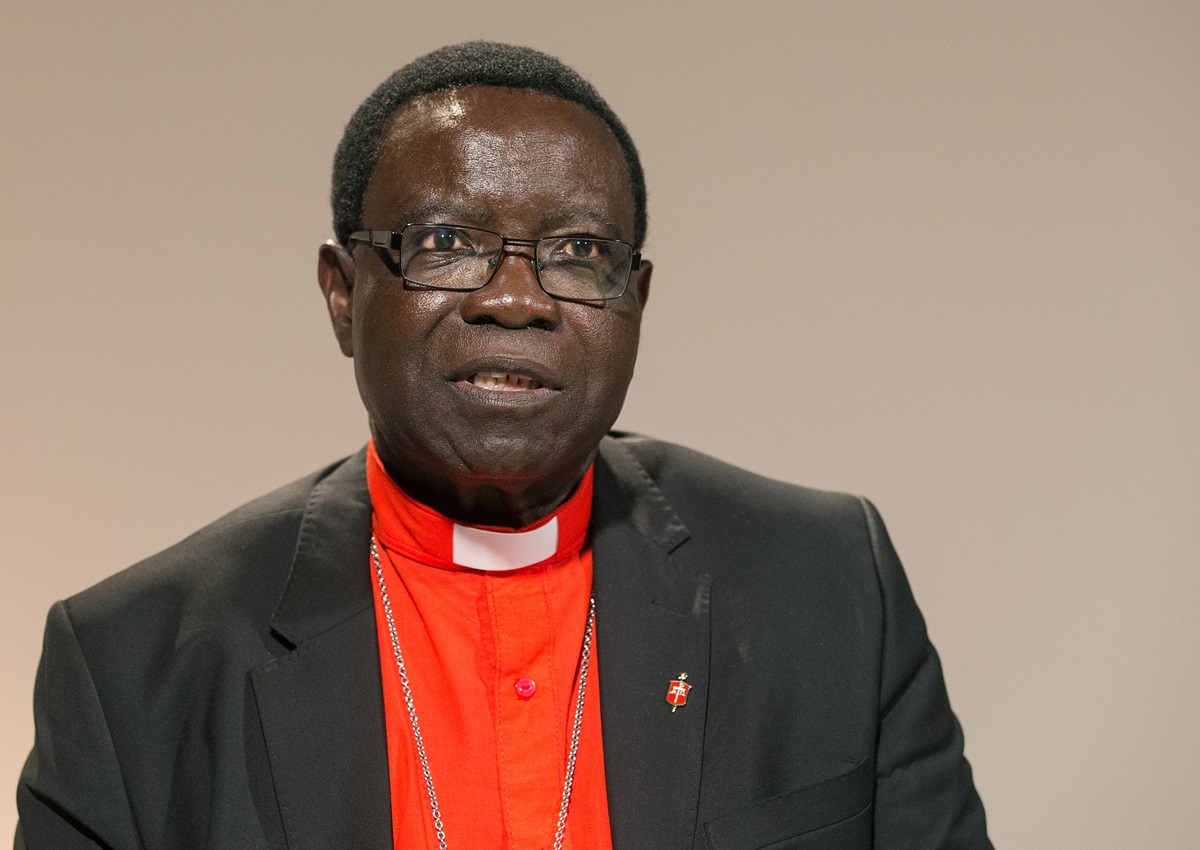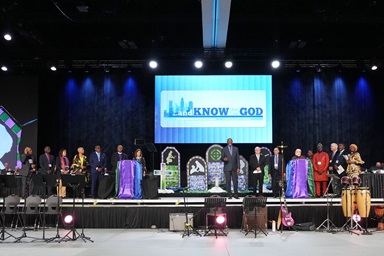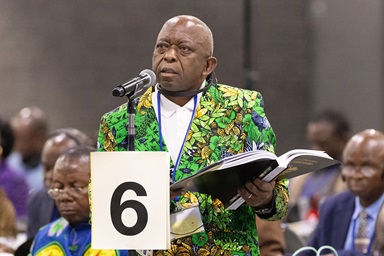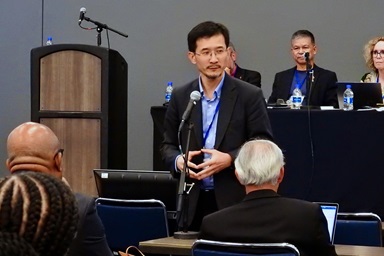Bishop Kasap Owan leads a growing part of The United Methodist Church, but with that growth comes great challenges.
Kasap, one of three new Congolese bishops elected in March, leads the South Congo Episcopal Area — which straddles his native Democratic Republic of Congo and its southern neighbor Zambia.
He just finished presiding over four annual conference sessions in Congo back to back and has yet another annual conference planned in Zambia later in August.
“I am very tired,” he admitted. Still, he was eager to talk about what is happening in his area during a visit to Nashville for a board meeting of the Commission on United Methodist Men.
His goal is for his area to become self-sustaining but he said he knows he’ll need help to get there.
Kasap’s area includes 52 districts, 1,045 pastors and more than 1.1 million church members, according to 2015 data from the denomination’s General Council on Finance and Administration. To put that in perspective, the U.S. North Central Jurisdiction — with nine bishops — has about 1.18 million members.
Most United Methodists in his area live on less than $2 a day, and they are contending with the aftermath of war or continuing factional violence.
“The church is growing in Congo first of all because people are poor and when people are suffering, they look to God to help them,” he said. “Secondly, Congo is a missionary country.”
Kasap and other Congolese believe the church, with God’s help, can relieve people’s suffering through evangelism and the promotion of social well-being.
While some churches pray for specific amounts of money, he said, The United Methodist Church is different. The denomination preaches not the prosperity gospel but the Gospels of Scripture. It also offers practical help such as education, he said.
To Support South Congo Ministries
The United Methodist Board of Global Ministries has established Advance designated funds to support ministry in the South Congo Episcopal Area:
Advance No. 00394A, a general fund to support mission wherever there is the greatest need in South Congo.
Advance No. 08596A, the designated fund to support South Congo Wings of the Morning aviation ministry.
The United Methodist commitment to educated clergy is especially important to Kasap. He has a Ph.D. in New Testament studies, and before his election as bishop, he served as president of Katanga Methodist University in Mulungushi. Six United Methodist bishops, including Kasap, are among the university’s graduates.
Kasap’s ancestral roots in the church go back to Methodism’s arrival in Congo in 1912. That year, Methodist Episcopal Bishop John Springer approached a Congolese chief with plans of planting churches in the area. The chief persuaded the bishop to establish a much-needed hospital first, and then a church. That chief was Kasap’s grandfather.
In his own ministry, Kasap aims to carry on this family tradition of caring for both people’s spiritual and physical needs.
He identified three primary needs in his area: Evangelism, education and health care. Specifically, he said, his area needs help building and restoring churches in a part of the world where many United Methodists still hold services outdoors. He also wants help providing the sort of schooling he received as a youngster, and improving health care.
He spoke especially of the need to train and hire more doctors for the United Methodist hospital in Kaponda, which has 250 beds but only two doctors.
Even getting to health care is a challenge in Congo. The country — which is about the size of the U.S. east of the Mississippi River — has less paved road than the state of Maryland.
In another part of Congo, North Katanga Episcopal Area has the Wings of the Morning, which flies people to receive medical care. Kasap would like to expand a smaller South Congo Wings of the Morning aviation ministry in his area.
To address these and other pressing needs, he has built relationships with the United Methodist Board of Global Ministries and a number of U.S. conferences, including New Mexico, Northwest Texas, Oklahoma and Pacific Northwest.
He also is working with Bikes and Bibles, coordinated by Joe Kilpatrick of the North Georgia Conference. That ministry provides motorcycles, bicycles and native-language Bibles across Africa.
Kilpatrick and Dr. Neil Nickelsen, another supporter of Bikes and Bibles, drove the bishop from Atlanta to his Nashville meetings. Kasap lived in Nickelsen’s home for seven months when he studied English in Atlanta some years back.
Kilpatrick has known Kasap for more than 10 years, and the two agree that the bikes are an important part of church ministry in Congo.
“The bicycle is the horse of the circuit rider, and this is a circuit-rider economy,” Kilpatrick said. “This is where the United States was in the 1750s.”
Despite his area’s many challenges, Kasap speaks with great hope for the work ahead.
“My hope is God,” he said. “If we have not confidence in God, we cannot do anything.”
He added that he also has hope in The United Methodist Church and the connections it provides.
“My hope is my partners,” he said. “You, my friends, can help us with the development of the church. The church is a change agent.”
Hahn is a multimedia news reporter for United Methodist News Service. Contact her at (615) 742-5470 or newsdesk@umcom.org. To read more United Methodist news, subscribe to the free Daily or Weekly Digests.
Like what you're reading? Support the ministry of UM News! Your support ensures the latest denominational news, dynamic stories and informative articles will continue to connect our global community. Make a tax-deductible donation at ResourceUMC.org/GiveUMCom.




